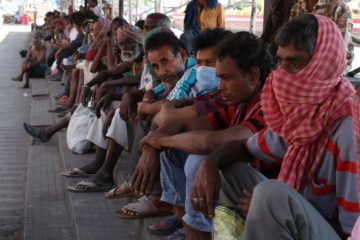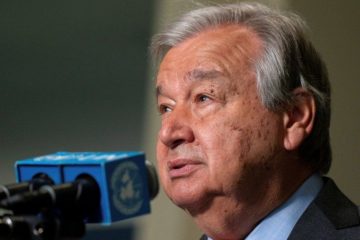The discourse surrounding the issue of economic inequality typically features an unequivocal framing of the two opposing sides– the “haves” and the “have-nots”. In the West, this dichotomy often pits bankers, corporate types and hedge-fund managers against lorry drivers, receptionists and teachers – the “ordinary people”. The Occupy movement embodies people’s growing discontent with perceived disparities in opportunity and affluence, giving rise to the narrative of the “99 percenters” vs. the “1 percent”.
But this dichotomous framing that we hear so often is a context-dependent one. This is because poverty here in the UK and other developed countries is very different to poverty in the world as a whole. In the UK, poverty is defined as a household income of less than around £15,000 a year. In stark contrast, poverty in the world is defined as living on less than $1.90 a day.

Of course, it would be absurd to say that there are not any “poor” people in the UK simply because there are much poorer people around the world. But this disparity between the conditions of an advanced, developed country and the world as a whole raises questions about how we here in the affluent West should evaluate inequality. How do our conceptions of the “haves” and the “have-nots” change when we assess inequality on a global level, rather than in individual countries?
In his book Doing Good Better, Oxford professor and co-founder of the Effective Altruism movement William MacAskill outlines how virtually everyone living in affluent countries, by dint of being inhabitants of such countries, is rich by global standards. To be in the notorious “1%” of the world, you only need to be earning above £34,000 per year if you’re working in the UK. If you’re in the US, it’s $52,000. In France, it’s €43,000.
The typical worker in the US makes $28,000, putting them in the top 5% of the world’s population. The average American household lives on about $55 per person per day, which doesn’t sound like a lot, but is five times higher than the global average. In the UK, people classified as living in poverty (making £15,000 a year) are actually still amongst the richest people in the world – better off than 84% of the world’s population. Therefore, even the poorest people in our communities here in the West are still amongst the richest people in the world.
Let’s look at me and you (university students). The median graduate starting salary in the UK is around £30,000, a figure that most students from LSE and other top universities will undoubtedly exceed in their careers. But even if this starting salary is all you manage to make throughout your career (a highly unlikely prospect), you would still be in the richest 2.4% of the world’s population. In fact, the average salary for LSE alumni is around £60,000. That means that the average LSE graduate is in the richest 0.3% of the world’s population.
Of course, goods and services are cheaper in poorer countries than they are in richer countries. A pound can buy you much more in Malawi than here in London. However, the figures above already reflect this fact, having been adjusted for cost of living. That is to say that the 705 million people in the world who live in extreme poverty (less than $1.90 a day) are genuinely living on what $1.90 can buy you in the USA – which isn’t a lot.
What our wealth and luck should mean
Income inequality is typically cited as a justification for the redistribution of wealth. Labour leader Jeremy Corbyn has called for a radical change to the way the economy operates to tackle “grotesque inequality” here in the UK. Across the pond, Bernie Sanders’ presidential campaign was fuelled by a growing outcry over the accumulation of wealth in the hands of the few, amid calls for increased taxes on the super-rich.
The argument is that these billionaires have benefited from a capitalist system that disproportionately rewards them, at the expense of the rest of the population. Demanding that the “1 percent” pay their “fair share” has been one of the core tenets of the global Occupy Movement, the complaint being that these billionaires haven’t truly “earned” their wealth.
But if we justify the redistribution of wealth in our countries by appealing to notions of fairness and justice, whereby the process is portrayed as a kind of rectification of the influence of luck and privilege in determining the ceiling of people’s potential achievement in life, how can we do so and at the same time turn a blind eye to the undeniable fact of our luck and privilege by dint of being born in rich countries?

Clearly, the economic disparity between rich and poor countries in the world is not simply a product of a lack of trying or intelligence amongst the people in the latter group of countries. It is purely a matter of luck: a girl born in Ethiopia today will not have chosen her parents, or the country she is born into, or the disease she is born with, or the impoverished economy she will have to confront. The same goes for a girl born in the UK today, and yet these two girls will have vastly different lives.
By looking at inequality in the world as a whole, we begin to understand this global luck of the draw. If we do in fact take our commitment to the redistribution of wealth seriously as a mechanism for delivering fairness and justice, then surely we must also extend that commitment to the millions of people around the world who aren’t as lucky as we are.
Source: Giving What We Can calculator – https://www.givingwhatwecan.org/get-involved/how-rich-am-i/


